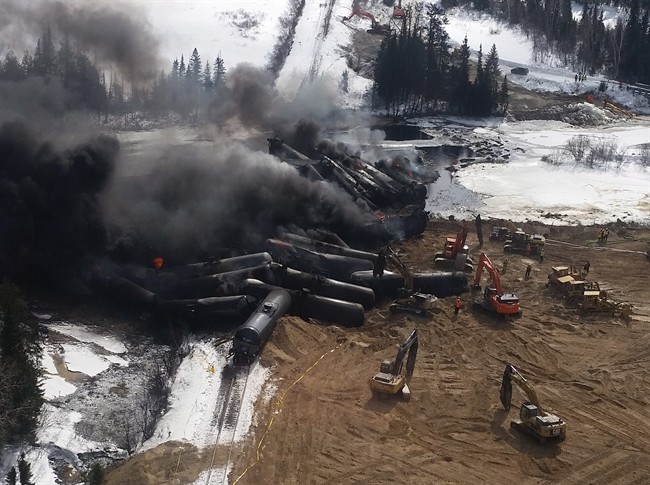TORONTO – Officials in a northern Ontario community where a train carrying crude oil derailed last year are urging CN Rail to do more to clean up the water.

Some crude entered the Mattagami River System when two dozen cars derailed near Gogama, Ont., in March 2015, but the chief of the Mattagami First Nation says he can still see oil floating on the water, so “it’s evident that the job hasn’t been done.”
“It makes you sick to your stomach when you see it,” Chief Walter Naveau said Tuesday at a news conference at the legislature. “I’m reluctant to eat the wildlife.”
Water is sacred for his community, he said.
“Those waters that were so pristine that I could take a cup and drink right out of it – after the derailment, no longer do I do it, no longer do my people,” Naveau said.
The majority of the oil has been cleaned up, but it could take a long time to find all of it, with so many small rivers and lakes in the water system, Environment Minister Glen Murray said.
READ MORE: Ottawa defends rail safety efforts after fiery derailment in Ontario
“We may get reports next spring that we thought we cleaned it all up and oil will show up because it’s in the sediment, it’s in the base of the river, so you have to be careful because the different approaches you take to remove it, you don’t want to disturb it,” Murray said.
- Invasive strep: ‘Don’t wait’ to seek care, N.S. woman warns on long road to recovery
- Ontario First Nation declares state of emergency amid skyrocketing benzene levels
- T. Rex an intelligent tool-user and culture-builder? Not so fast, says new U of A research
- Do Canadians have an appetite for electric vehicles? Experts are divided
“We’re very pressed with some urgency to get as much cleaned up as possible before the winter, but we fully expect with CN that we’ll be back at it again in the spring and next year.”
New Democrat France Gelinas warns that the area around the Makami River could become the next Grassy Narrows, where the water has been contaminated for decades with mercury. But Murray said oil behaves differently than mercury, and is easier to remove because it eventually floats to the top.
READ MORE: Safety concerns rise in wake of a CN train derailment in northern Ontario
CN said in a statement that it has remediated the affected water, soil and sediment so there’s no threat to humans or animals.
“CN’s environmental experts, and the regulators overseeing the remediation of the Gogama derailment, agree that going after the small residues of oil at the site will do more environmental harm than good,” the company said.
The “slight detections” of oil that remain in the riverbank and sediment aren’t in the community’s water supply, the company said. Oil sheens may rise to the surface if the riverbank is poked, CN said, but the sheen contains a “very small” amount of oil that doesn’t present a threat to the environment.
READ MORE: Residents asked to stay indoors after train carrying crude derails in northern Ontario
CN officials are now monitoring the affected sites and collecting data that will be used to “develop any necessary work programs in the coming months.”
Mike Benson, Gogama’s fire chief, scoffed at the company’s monitoring efforts.
“They’re monitoring them, like it’s going to get up and go away all by itself,” he said.
“The ice this winter is going to wash it into the lake, continue to poison us, poison our lake, poison our fish for generations to come. Our chance is now to clean the river out and ensure a reasonably safe future.”
River booms will remain in place to collect small amounts of oil sheen until the water freezes over, CN said.
“Removing all of the remaining oil from the sediment on the bottom of the Makami River would result in net environmental damage and make it much more difficult for the aquatic ecosystem to recover,” it said.



Comments